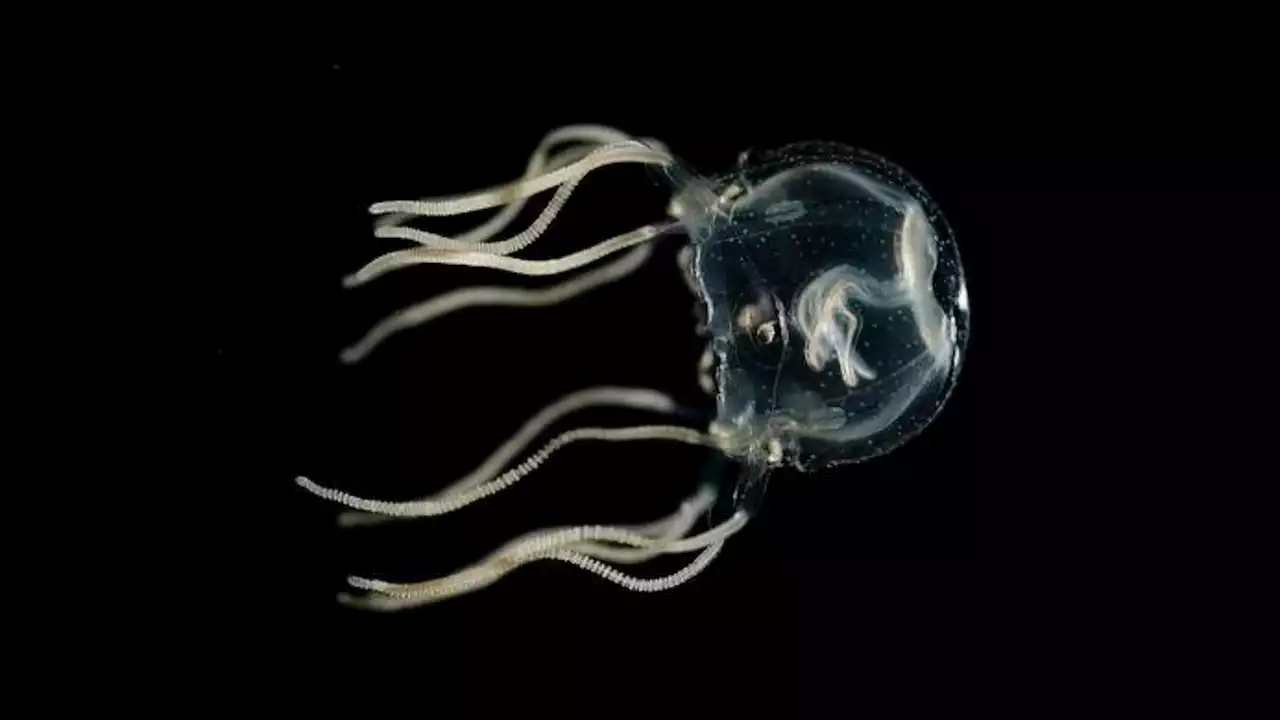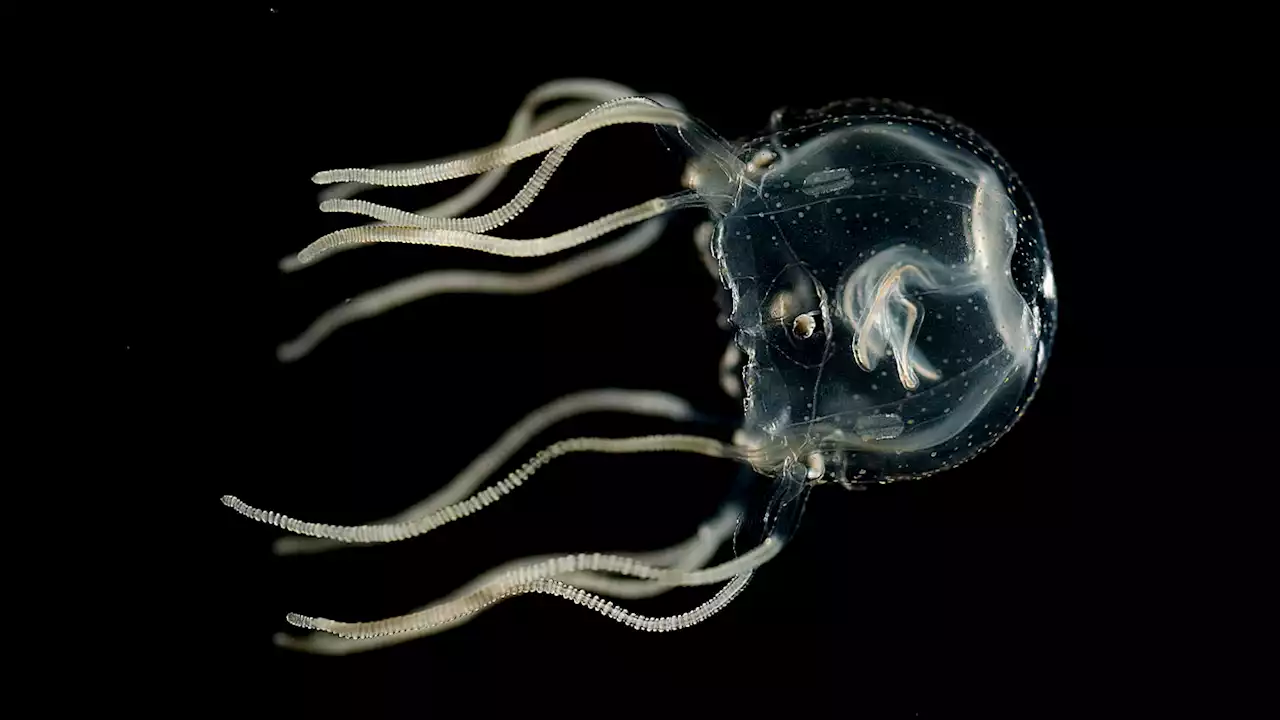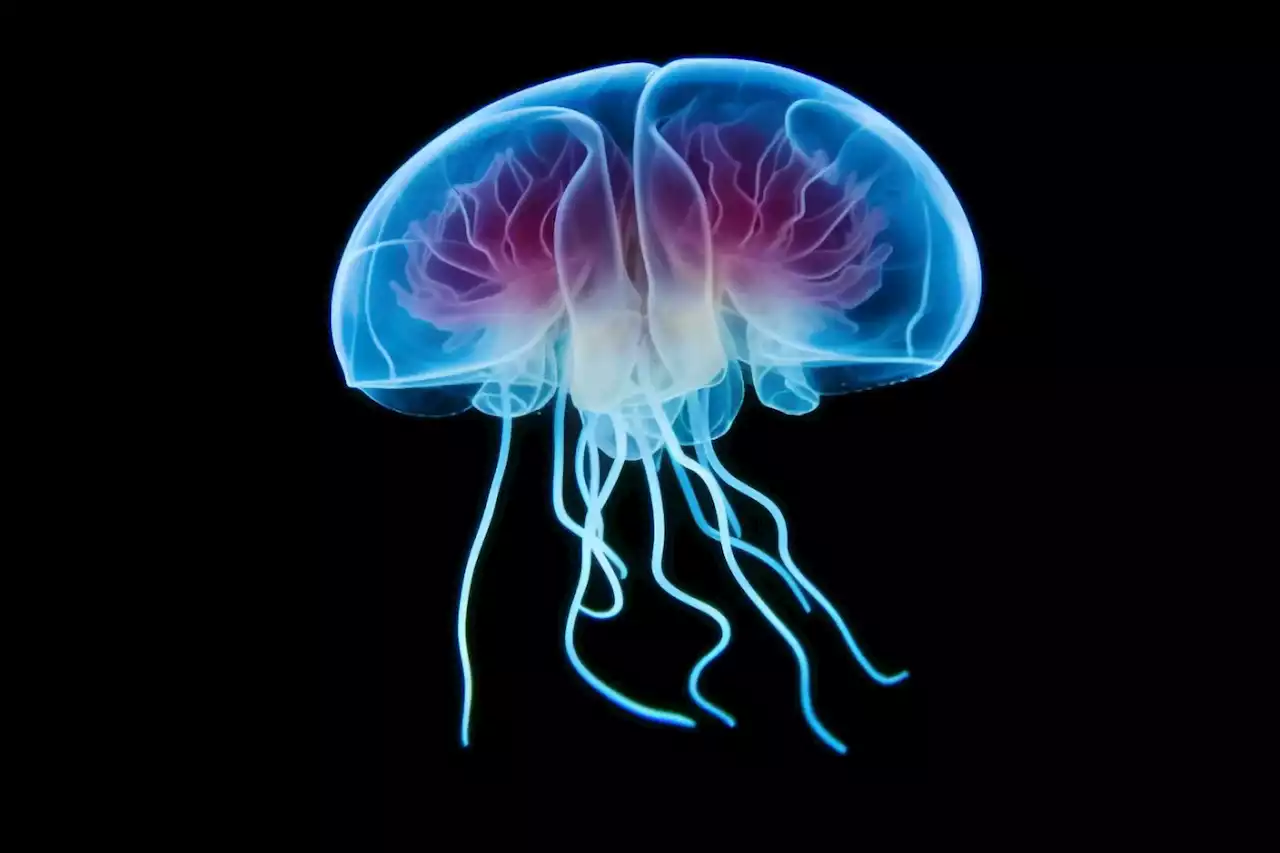Jellyfish Learning Abilities: Challenging Neuroscientific Notions Even without a central brain, jellyfish can learn from past experiences like humans, mice, and flies, scientists report for the first time on September 22 in the journal Current Biology. They trained Caribbean box jellyfish (Tripedal
Jellyfish, despite lacking centralized brains, exhibit advanced learning abilities similar to humans and other complex organisms, challenging traditional beliefs about neural learning processes.Even without a central brain, jellyfish can learn from past experiences like humans, mice, and flies, scientists report for the first time on September 22 in the journal. They trained Caribbean box jellyfish to learn to spot and dodge obstacles.
The researchers showed the stationary rhopalium moving gray bars to mimic the animal’s approach to objects. The structure did not respond to light gray bars, interpreting them as distant. However, after the researchers trained the rhopalium with weak electric stimulation when the bars approach, it started generating obstacle-dodging signals in response to the light gray bars. These electric stimulations mimicked the mechanical stimuli of a collision.
“It’s surprising how fast these animals learn; it’s about the same pace as advanced animals are doing,” says Garm. “Even the simplest nervous system seems to be able to do advanced learning, and this might turn out to be an extremely fundamental cellular mechanism invented at the dawn of the evolution nervous system.”
Malaysia Latest News, Malaysia Headlines
Similar News:You can also read news stories similar to this one that we have collected from other news sources.
 Brainless jellyfish show they can learn from past experienceEven without a central brain, jellyfish can learn from past experiences like humans, mice, and flies.
Brainless jellyfish show they can learn from past experienceEven without a central brain, jellyfish can learn from past experiences like humans, mice, and flies.
Read more »
 These brainless jellyfish use their eyes and bundles of nerves to learnNo brain? No problem for Caribbean box jellyfish. Their seemingly simple nervous systems can learn to avoid obstacles on sight, a study suggests.
These brainless jellyfish use their eyes and bundles of nerves to learnNo brain? No problem for Caribbean box jellyfish. Their seemingly simple nervous systems can learn to avoid obstacles on sight, a study suggests.
Read more »
 Jellyfish, with no central brain, shown to learn from past experienceEven without a central brain, jellyfish can learn from past experiences like humans, mice, and flies, scientists report for the first time. They trained Caribbean box jellyfish (Tripedalia cystophora) to learn to spot and dodge obstacles. The study challenges previous notions that advanced learning requires a centralized brain and sheds light on the evolutionary roots of learning and memory.
Jellyfish, with no central brain, shown to learn from past experienceEven without a central brain, jellyfish can learn from past experiences like humans, mice, and flies, scientists report for the first time. They trained Caribbean box jellyfish (Tripedalia cystophora) to learn to spot and dodge obstacles. The study challenges previous notions that advanced learning requires a centralized brain and sheds light on the evolutionary roots of learning and memory.
Read more »
 Weekly: First ever RNA from an extinct animal; big news about small solar system objects; “brainless” jellyfish can still learn216For the first time ever, a team has extracted RNA from an extinct animal. Thylacines, or Tasmanian tigers, are carnivorous marsupials that went extinct in the early 20th century. While we’ve been extracting DNA from extinct animals for years, getting their RNA has been much more difficult. What can this breakthrough tell us about the lives they led?What is consciousness and how does it work? There’s a reason this is known as “the hard problem” of neuroscience. Everyone wants an answer but only a handful of convincing theories exist. And now, one of the more compelling theories - integrated information theory, or IIT - has come under fire. Are critics right to label it ‘pseudoscience’?Eris and Makemake are two dwarf planets that orbit in the Kuiper belt in the outer reaches of our solar system. They’re small, icy objects that receive little sunlight, so we might expect them to be pretty boring – but it seems we were wrong. Why a closer look from the James Webb Space Telescope is painting an intriguing new picture, one that may include liquid water.Despite not having brains, Caribbean box jellyfish still have the capacity to learn. How are they processing the information without a centralised brain? One team thinks it could have something to do with their 24 eye-like structures. Find out how they tested this theory.Plus: A new kind of ‘reverse vaccine’ that could help people with autoimmune diseases, the earliest evidence of human ancestors building wooden structures, and counting the number of cells in a human body. Hosts Christie Taylor and Chelsea Whyte discuss all of this with guests Clare Wilson, Leah Crane and Corryn Wetzel. To read more about these stories, visit newscientist.com.Events and Links:New Scientist Live tickets
Weekly: First ever RNA from an extinct animal; big news about small solar system objects; “brainless” jellyfish can still learn216For the first time ever, a team has extracted RNA from an extinct animal. Thylacines, or Tasmanian tigers, are carnivorous marsupials that went extinct in the early 20th century. While we’ve been extracting DNA from extinct animals for years, getting their RNA has been much more difficult. What can this breakthrough tell us about the lives they led?What is consciousness and how does it work? There’s a reason this is known as “the hard problem” of neuroscience. Everyone wants an answer but only a handful of convincing theories exist. And now, one of the more compelling theories - integrated information theory, or IIT - has come under fire. Are critics right to label it ‘pseudoscience’?Eris and Makemake are two dwarf planets that orbit in the Kuiper belt in the outer reaches of our solar system. They’re small, icy objects that receive little sunlight, so we might expect them to be pretty boring – but it seems we were wrong. Why a closer look from the James Webb Space Telescope is painting an intriguing new picture, one that may include liquid water.Despite not having brains, Caribbean box jellyfish still have the capacity to learn. How are they processing the information without a centralised brain? One team thinks it could have something to do with their 24 eye-like structures. Find out how they tested this theory.Plus: A new kind of ‘reverse vaccine’ that could help people with autoimmune diseases, the earliest evidence of human ancestors building wooden structures, and counting the number of cells in a human body. Hosts Christie Taylor and Chelsea Whyte discuss all of this with guests Clare Wilson, Leah Crane and Corryn Wetzel. To read more about these stories, visit newscientist.com.Events and Links:New Scientist Live tickets
Read more »
 No Brain, No Problem: The Surprising Intellect of Jellyfish Changes Our Fundamental Understanding of the BrainJellyfish are more advanced than once thought. A new study from the University of Copenhagen has demonstrated that Caribbean box jellyfish can learn at a much more complex level than ever imagined – despite only having one thousand nerve cells and no centralized brain. The finding changes our fundam
No Brain, No Problem: The Surprising Intellect of Jellyfish Changes Our Fundamental Understanding of the BrainJellyfish are more advanced than once thought. A new study from the University of Copenhagen has demonstrated that Caribbean box jellyfish can learn at a much more complex level than ever imagined – despite only having one thousand nerve cells and no centralized brain. The finding changes our fundam
Read more »
